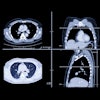On Capitol Hill, AdvaMed pressed for the U.S. Centers for Medicare and Medicaid Services (CMS) to quickly formalize a payment pathway for AI-enabled medical technology.
The medical technology industry association and its constituents hosted an AI Demonstration Day event, emphasizing that a clear Medicare reimbursement pathway is critical at this time.
“Because medtech is constantly evolving, giving clinicians enhanced options for patient diagnoses and treatments, it’s important that reimbursement policies keep pace," stated AdvaMed President and CEO Scott Whitaker in a news release.
Manufacturers face an uncertain regulatory landscape, according to Senators Martin Heinrich (D-NM), Mike Rounds (R-SD), and others, who supported AI reimbursement concerns in a June 10 letter to CMS Administrator Chiquita Brooks-LaSure. In the letter, they penned the term "algorithm-based health care services" (ABHS) in relation to establishing uniform payment standards.
ABHS is defined as medical devices cleared by the U.S. Food and Drug Administration (FDA) that rely on Al, machine learning, or other similar software to produce quantitative and/or qualitative clinical information to aid in the diagnosis or treatment of a patient's condition that cannot be otherwise obtained by their healthcare provider, the letter stated.
Members of the Senate AI Caucus urged the CMS to take two impactful steps. One is to codify in regulation the CMS' existing Software-as-a-Service (SaaS) payment policy that the agency articulated in the calendar year 2023 Medicare [Hospital Outpatient Prospective Payment System] HOPPS Final Rule to provide stability and certainty moving forward. The other is to modify both the New Technology Ambulatory Payment Classification (APC) application requirements and corresponding annual payment policies, according to the letter.
AdvaMed applauded the Senate AI Caucus for its support of policies to expand patient access to AI-enabled medical technologies.
"We look forward to continuing to work with Congress and CMS to ensure that Medicare beneficiaries can benefit from remarkable, proven medical technology as soon as it is authorized and available, not years after the fact,” Whitaker added.



















